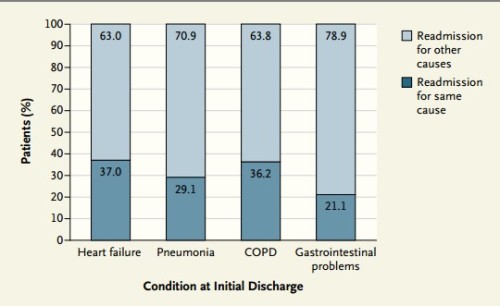Causes of thirty-day rehospitalizations, by condition at initial discharge:
The probability of returning to the hospital in thirty days, even for a different cause, is heightened by what Harlan Krumholz calls “post-hospital syndrome.”
Hospitalized patients often experience disturbance of sleep, and studies have revealed polysomnographic abnormalities in hospitalized patients, including reductions in sleep time and stages R (rapid eye movement [REM]) and N3 (slow wave) and an increase in stage N1 (non-REM). This disruption can have debilitating behavioral and physiological effects: sleep deprivation adversely affects metabolism, cognitive performance, physical functioning and coordination, immune function, coagulation cascade, and cardiac risk. […]
In one study, one fifth of hospitalized patients 65 years of age or older had an average nutrient intake of less than 50% of their calculated maintenance energy requirements. […] These deficits, rarely addressed at discharge, can lead to protein-energy malnutrition. Friedmann et al. have found loss of weight and decreased blood albumin levels after discharge to be strong predictors of readmission within 30 days. Meanwhile, malnutrition can affect every system in the body, resulting in impairment of wound healing, increased risk of infections and pressure ulcers, decreased respiratory and cardiac function, poorer outcomes of chronic lung diseases, increased risk of cardiovascular and gastrointestinal disorders, and poorer physical function. […]
Pain and other discomforts, common among these patients, are often inadequately addressed. They can lead to sleep disorders, mood disturbances, and impaired cognitive functioning, and are known to influence immune and metabolic function. Moreover, medications to treat symptoms can negatively affect the early recovery period. Sedatives, especially benzodiazepines, are commonly prescribed and may become part of the discharge regimen. Undersedation can cause hypercatabolism, immunosuppression, hypercoagulability, and increased sympathetic activity. Oversedation can dull the senses and impair cognitive function and judgment and may also lead to post-traumatic stress disorder.
The original source for Krumholz’s chart is Jencks et al.



